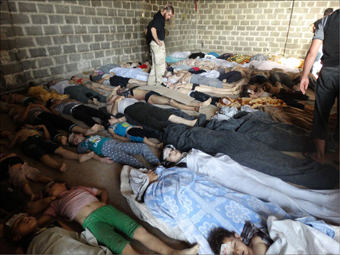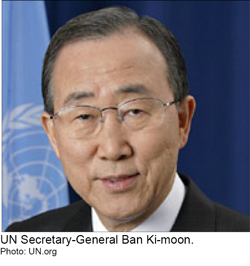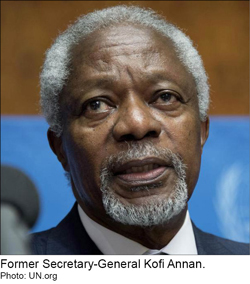
UNITED NATIONS (FinalCall.com) – A report by the Voice of Russia and some connected to the European Union that the UN chemical weapons inspection team would release its findings two weeks early was denied by an associate spokesman for UN Secretary-General Ban Ki-moon.
On Sept. 4, Mr. Ban’s lead spokesman told reporters in St. Petersburg, Russia, where he is attending the G-20 Summit: “UN will not post tentative findings, there will only be a final report.” The report was also not released the following day, as had been rumored.
However, in the corridors of the UN there was speculation the world body was feeling left on the sidelines due to President Obama’s assertion that proceeding against Syria without the UN was possible. There was also concern the UN might be feeling bullied into releasing partial findings ahead of a previously stated deadline.
The G-20 summit is an economic forum composed of the world’s major policy making nations.

“We have to look back at what happened in 1991, when the U.S. and the United Kingdom mounted a campaign of pressuring the UN weapons inspectors in Iraq by challenging the process; and finally by doctoring the final report,” said James Paul, human rights activist and former executive director of the UN watchdog organization the Global Policy Forum.
The Western powers are using their considerable assets within the UN system to hamper a transparent report from the team sent to Syria, Mr. Paul told The Final Call. “The reason for that is they want to prevent any evidence coming forth that is contrary to what they have been saying,” he said. “As far as what is happening with the Syrian report, we just don’t know.”
For two days, Sept. 3 and Sept. 4, reporters questioned not only Mr. Ban but his deputy spokesperson on why the chemical inspectors were mandated not to bring back evidence of who used the chemicals; but only to show if weapons were used during the August 21 attack in Ghouta, near the Syrian capital of Damascus? The incident killed 355 and affected 3,000, according to Doctors Without Borders.
The UN spokesman said, “The secretary-general made it clear that he had taken the decision to determine whether or not chemical weapons had been used and not who used them. That is in line with previous such investigations.”
The UN spokesman was asked if the secretary-general thought it useful or not, that the U.S. Senate Foreign Relations Committee by a 10 to 7 vote stated that the U.S. should engage the Syrian regime militarily. “The secretary-general wouldn’t have any comment on the timing of domestic legislative processes, but he has been very clearly called for countries to allow the work of the team to be done,” the spokesman told reporters.
It is clear why U.S. Secretary of State John Kerry is questioning the efficacy of the UN investigation, the fix is in, said Mr. Paul. “The U.S. and its allies get Mr. Ki-Moon to say there will be no mandate on who used the chemicals on Aug. 21, and then Kerry says: See UN inspections are no good; and once again the UN gets sucked into doing the West’s bidding.”
Phyllis Bennis, director of the New Internationalism Center at the Washington, D.C.-based Institute for Policy Studies, agrees with Mr. Paul’s assessment of the secretary of state’s posture. “Mr. Kerry has not been quite honest concerning the issue of the UN inspections, and what the U.S. really knows,” she said during a recent interview on CCTV America.
“I don’t think the U.S. has compelling evidence, what they have is little pieces of speculation that fits their version of what seems logical,” Ms. Bennis said.
On Sept. 4, former Secretary-General Kofi Annan, chairman of The Elders, a group formed by former President of South Africa Nelson Mandela in 2007 sent a letter to the 193-member UN General Assembly, saying “there is no military solution to this conflict,” and member states must wait for the work of UN inspectors to be finished.

Some nations attending the G-20 summit agreed that the UN was needed as a partner in the Syrian crisis. Germany called for a “united international response” through the UN. Italy opposes military strikes without a UN resolution. Brazil says no military action without UN resolution and Australia, which holds the rotating presidency of the 15-member UN Security Council, said it won’t take part in any military action against Syria, according to France 24 International News 24/7.
“The UN General Assembly represents the people of the world as opposed to the Security Council that represents the dominant powers of the world; therefore the GA must stand up and take a position on what is happening in Syria,” Ramsey Clark, co-founder of the International Action Center, told The Final Call.
The violence will only escalate if the U.S. strikes Syria, he said.
In the meantime, in corridors there was much speculation on whether the UN would be hurried to release its findings and who would it release them to–the Security Council or the General Assembly.












